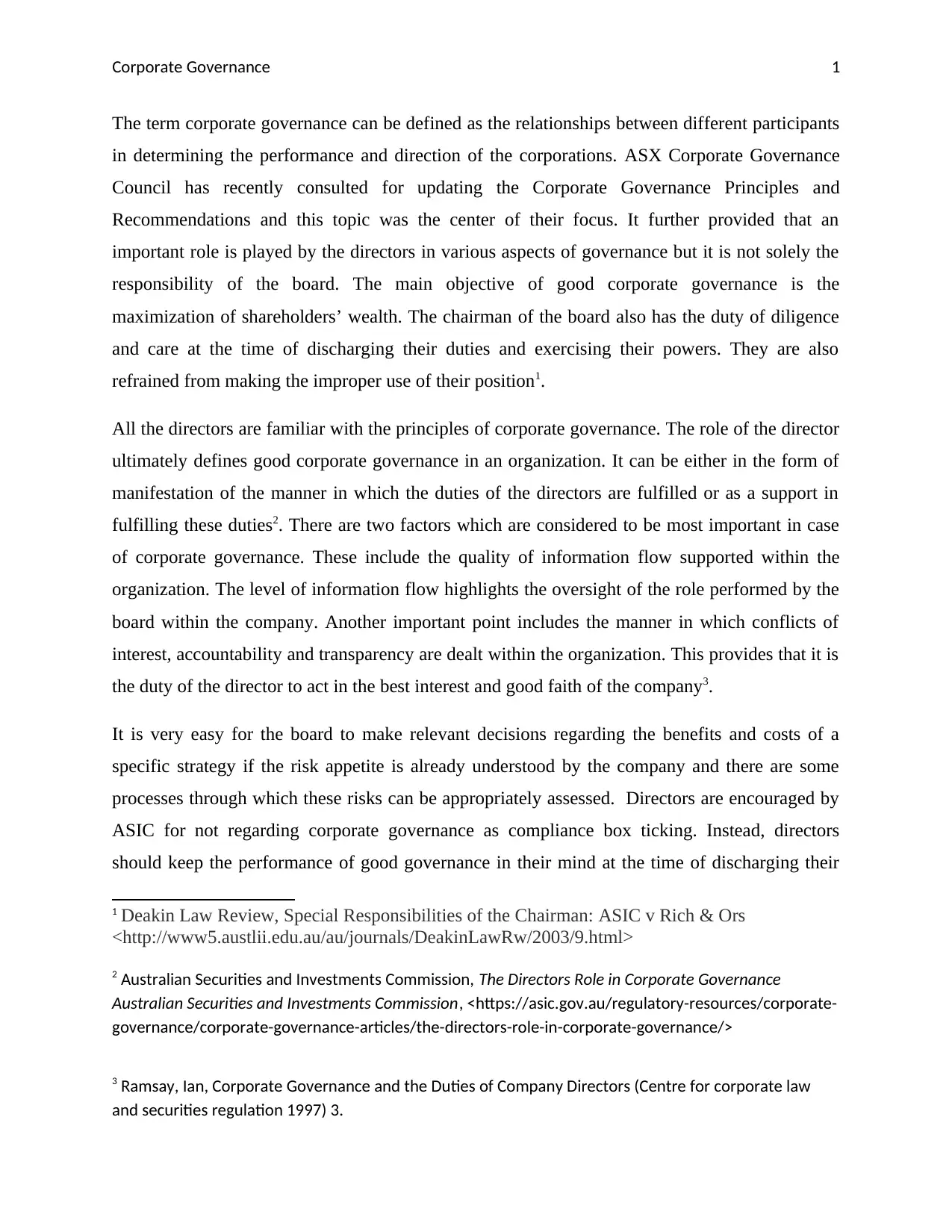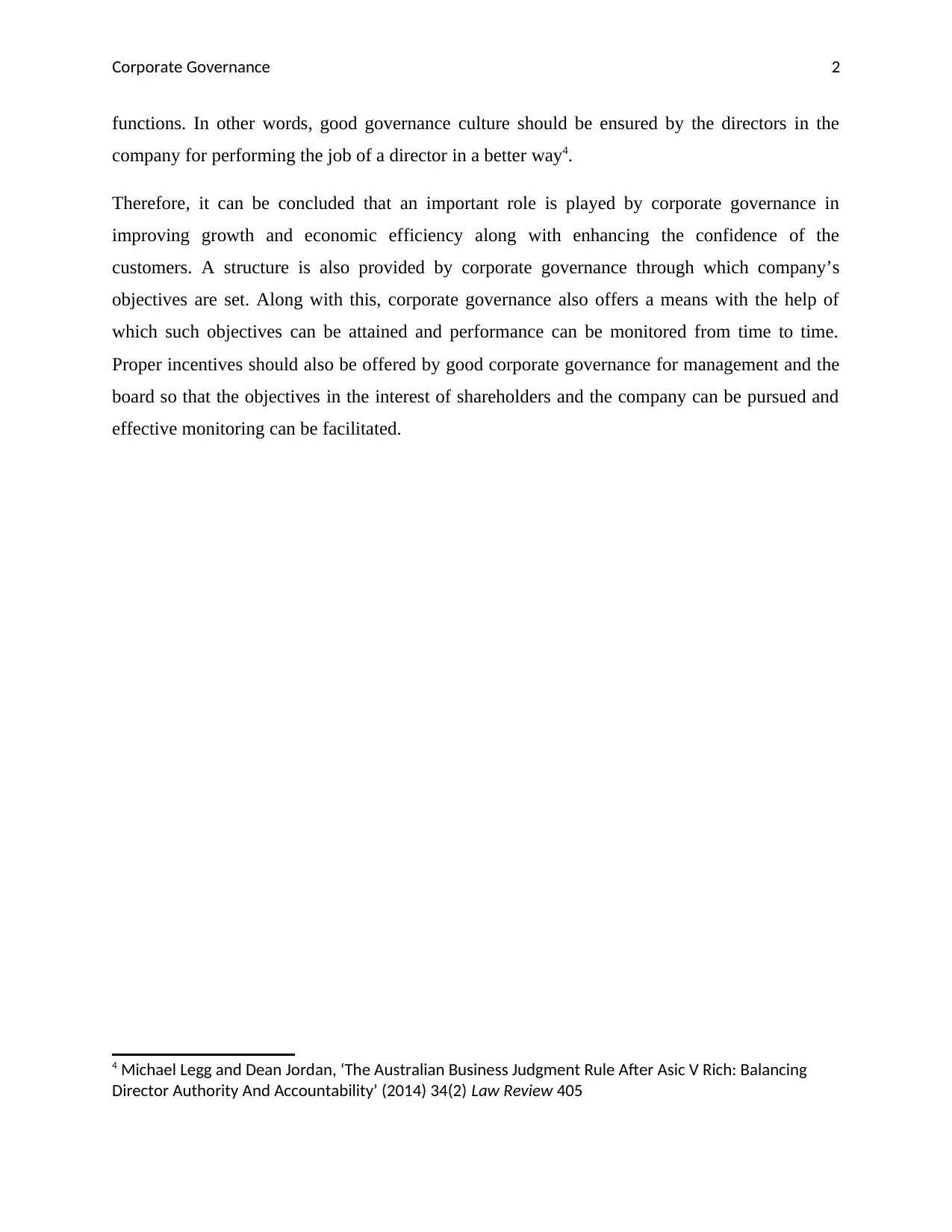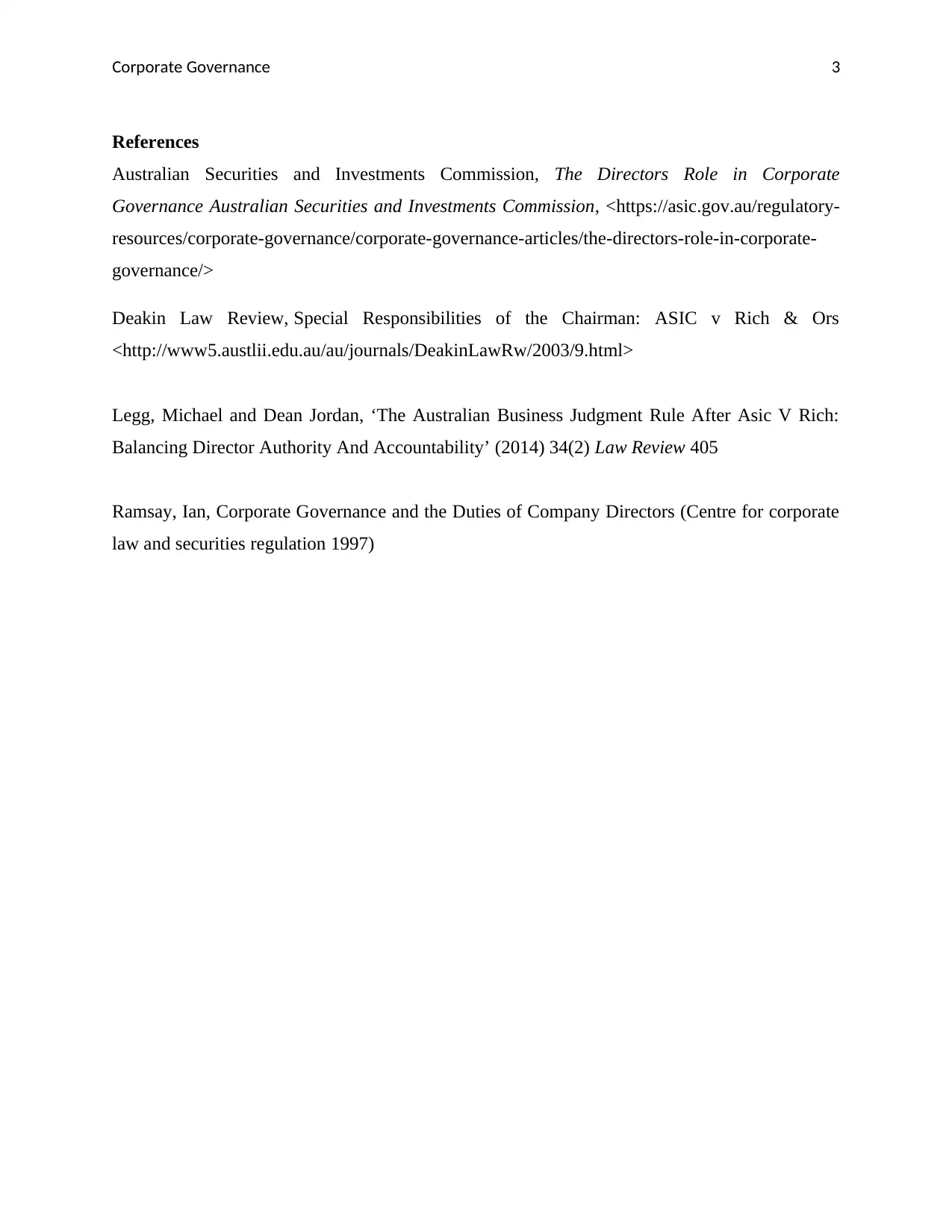Corporate Governance & Director's Duties: An Analysis - Essay
VerifiedAdded on 2023/06/10
|4
|719
|371
Essay
AI Summary
This essay explores the relationship between corporate governance and the role of directors, emphasizing how directors' duties either manifest or support good governance. It highlights the importance of information flow, conflict of interest management, accountability, and transparency within an organization. The essay also references ASIC's encouragement for directors to view corporate governance beyond mere compliance, advocating for a good governance culture. Ultimately, it concludes that corporate governance plays a vital role in enhancing economic efficiency, improving growth, and boosting customer confidence by providing a structure for setting objectives and monitoring performance.

RUNNING HEAD: Corporate Governance
Corporate Governance
Corporate Governance
Paraphrase This Document
Need a fresh take? Get an instant paraphrase of this document with our AI Paraphraser

Corporate Governance 1
The term corporate governance can be defined as the relationships between different participants
in determining the performance and direction of the corporations. ASX Corporate Governance
Council has recently consulted for updating the Corporate Governance Principles and
Recommendations and this topic was the center of their focus. It further provided that an
important role is played by the directors in various aspects of governance but it is not solely the
responsibility of the board. The main objective of good corporate governance is the
maximization of shareholders’ wealth. The chairman of the board also has the duty of diligence
and care at the time of discharging their duties and exercising their powers. They are also
refrained from making the improper use of their position1.
All the directors are familiar with the principles of corporate governance. The role of the director
ultimately defines good corporate governance in an organization. It can be either in the form of
manifestation of the manner in which the duties of the directors are fulfilled or as a support in
fulfilling these duties2. There are two factors which are considered to be most important in case
of corporate governance. These include the quality of information flow supported within the
organization. The level of information flow highlights the oversight of the role performed by the
board within the company. Another important point includes the manner in which conflicts of
interest, accountability and transparency are dealt within the organization. This provides that it is
the duty of the director to act in the best interest and good faith of the company3.
It is very easy for the board to make relevant decisions regarding the benefits and costs of a
specific strategy if the risk appetite is already understood by the company and there are some
processes through which these risks can be appropriately assessed. Directors are encouraged by
ASIC for not regarding corporate governance as compliance box ticking. Instead, directors
should keep the performance of good governance in their mind at the time of discharging their
1 Deakin Law Review, Special Responsibilities of the Chairman: ASIC v Rich & Ors
<http://www5.austlii.edu.au/au/journals/DeakinLawRw/2003/9.html>
2 Australian Securities and Investments Commission, The Directors Role in Corporate Governance
Australian Securities and Investments Commission, <https://asic.gov.au/regulatory-resources/corporate-
governance/corporate-governance-articles/the-directors-role-in-corporate-governance/>
3 Ramsay, Ian, Corporate Governance and the Duties of Company Directors (Centre for corporate law
and securities regulation 1997) 3.
The term corporate governance can be defined as the relationships between different participants
in determining the performance and direction of the corporations. ASX Corporate Governance
Council has recently consulted for updating the Corporate Governance Principles and
Recommendations and this topic was the center of their focus. It further provided that an
important role is played by the directors in various aspects of governance but it is not solely the
responsibility of the board. The main objective of good corporate governance is the
maximization of shareholders’ wealth. The chairman of the board also has the duty of diligence
and care at the time of discharging their duties and exercising their powers. They are also
refrained from making the improper use of their position1.
All the directors are familiar with the principles of corporate governance. The role of the director
ultimately defines good corporate governance in an organization. It can be either in the form of
manifestation of the manner in which the duties of the directors are fulfilled or as a support in
fulfilling these duties2. There are two factors which are considered to be most important in case
of corporate governance. These include the quality of information flow supported within the
organization. The level of information flow highlights the oversight of the role performed by the
board within the company. Another important point includes the manner in which conflicts of
interest, accountability and transparency are dealt within the organization. This provides that it is
the duty of the director to act in the best interest and good faith of the company3.
It is very easy for the board to make relevant decisions regarding the benefits and costs of a
specific strategy if the risk appetite is already understood by the company and there are some
processes through which these risks can be appropriately assessed. Directors are encouraged by
ASIC for not regarding corporate governance as compliance box ticking. Instead, directors
should keep the performance of good governance in their mind at the time of discharging their
1 Deakin Law Review, Special Responsibilities of the Chairman: ASIC v Rich & Ors
<http://www5.austlii.edu.au/au/journals/DeakinLawRw/2003/9.html>
2 Australian Securities and Investments Commission, The Directors Role in Corporate Governance
Australian Securities and Investments Commission, <https://asic.gov.au/regulatory-resources/corporate-
governance/corporate-governance-articles/the-directors-role-in-corporate-governance/>
3 Ramsay, Ian, Corporate Governance and the Duties of Company Directors (Centre for corporate law
and securities regulation 1997) 3.

Corporate Governance 2
functions. In other words, good governance culture should be ensured by the directors in the
company for performing the job of a director in a better way4.
Therefore, it can be concluded that an important role is played by corporate governance in
improving growth and economic efficiency along with enhancing the confidence of the
customers. A structure is also provided by corporate governance through which company’s
objectives are set. Along with this, corporate governance also offers a means with the help of
which such objectives can be attained and performance can be monitored from time to time.
Proper incentives should also be offered by good corporate governance for management and the
board so that the objectives in the interest of shareholders and the company can be pursued and
effective monitoring can be facilitated.
4 Michael Legg and Dean Jordan, ‘The Australian Business Judgment Rule After Asic V Rich: Balancing
Director Authority And Accountability’ (2014) 34(2) Law Review 405
functions. In other words, good governance culture should be ensured by the directors in the
company for performing the job of a director in a better way4.
Therefore, it can be concluded that an important role is played by corporate governance in
improving growth and economic efficiency along with enhancing the confidence of the
customers. A structure is also provided by corporate governance through which company’s
objectives are set. Along with this, corporate governance also offers a means with the help of
which such objectives can be attained and performance can be monitored from time to time.
Proper incentives should also be offered by good corporate governance for management and the
board so that the objectives in the interest of shareholders and the company can be pursued and
effective monitoring can be facilitated.
4 Michael Legg and Dean Jordan, ‘The Australian Business Judgment Rule After Asic V Rich: Balancing
Director Authority And Accountability’ (2014) 34(2) Law Review 405
⊘ This is a preview!⊘
Do you want full access?
Subscribe today to unlock all pages.

Trusted by 1+ million students worldwide

Corporate Governance 3
References
Australian Securities and Investments Commission, The Directors Role in Corporate
Governance Australian Securities and Investments Commission, <https://asic.gov.au/regulatory-
resources/corporate-governance/corporate-governance-articles/the-directors-role-in-corporate-
governance/>
Deakin Law Review, Special Responsibilities of the Chairman: ASIC v Rich & Ors
<http://www5.austlii.edu.au/au/journals/DeakinLawRw/2003/9.html>
Legg, Michael and Dean Jordan, ‘The Australian Business Judgment Rule After Asic V Rich:
Balancing Director Authority And Accountability’ (2014) 34(2) Law Review 405
Ramsay, Ian, Corporate Governance and the Duties of Company Directors (Centre for corporate
law and securities regulation 1997)
References
Australian Securities and Investments Commission, The Directors Role in Corporate
Governance Australian Securities and Investments Commission, <https://asic.gov.au/regulatory-
resources/corporate-governance/corporate-governance-articles/the-directors-role-in-corporate-
governance/>
Deakin Law Review, Special Responsibilities of the Chairman: ASIC v Rich & Ors
<http://www5.austlii.edu.au/au/journals/DeakinLawRw/2003/9.html>
Legg, Michael and Dean Jordan, ‘The Australian Business Judgment Rule After Asic V Rich:
Balancing Director Authority And Accountability’ (2014) 34(2) Law Review 405
Ramsay, Ian, Corporate Governance and the Duties of Company Directors (Centre for corporate
law and securities regulation 1997)
1 out of 4
Related Documents
Your All-in-One AI-Powered Toolkit for Academic Success.
+13062052269
info@desklib.com
Available 24*7 on WhatsApp / Email
![[object Object]](/_next/static/media/star-bottom.7253800d.svg)
Unlock your academic potential
Copyright © 2020–2025 A2Z Services. All Rights Reserved. Developed and managed by ZUCOL.



![In-depth Case Study of ASIC v Flugge & Geary [2016] VSC 779 Law](/_next/image/?url=https%3A%2F%2Fdesklib.com%2Fmedia%2Fdocument%2Fpages%2F2024-07-29%2Fasic-v-flugge-geary-2016-vsc-779-a-case-study-on-directors-duties-page-2.webp&w=256&q=75)

